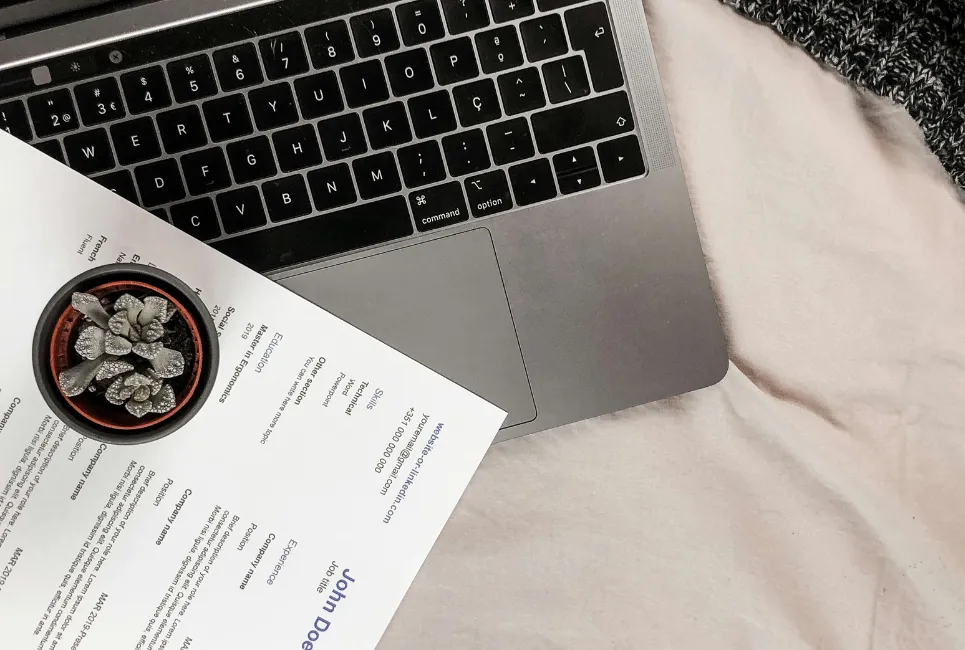In today’s hyper-competitive university and job market, your CV needs to be spot-on to stand any chance of being noticed. Among the various sections of your CV, the work experience section holds significant importance as it showcases your skills, qualifications, and suitability for the university or job position you are applying for.
Whether you are looking to gain work experience for your university application or you’ve just graduated and wish to begin your career pathway, here are some expert tips on how to write your work experience into your CV.
1. Start With Your Most Recent or Current Work Experience
When listing your work experience, always start with your most recent or current job and work backwards. This reverse chronological order helps employers see your most relevant work experience first. Include the job title or work/personal experience, company name, location, and duration dates. For instance, if your latest internship was as a Marketing Assistant Intern, you would list that first, followed by previous roles.
2. Keep Work Experience Sections Clear and Concise
A CV should be easy to read and understand. Use bullet points to list your responsibilities and achievements in each role, and avoid lengthy paragraphs. Keep your descriptions clear and to the point. For example, instead of writing a long narrative, use bullet points like:
- Managed social media accounts, increasing followers by 30%
- Coordinated marketing campaigns, supporting the delivery of 30 campaigns in the quarter
Read our article on to write: How to Add Work Experience in a Personal Statement
3. Tailor Your Work Experience to Your Career Goals
Customise your CV for each job or university application. Highlight the work experience most relevant to the position you are applying for and align it with your career goals. If you’re applying for a marketing placement, emphasise your marketing-related roles and achievements. Tailoring your CV shows companies that you have the specific skills and experience they are looking for.
Join the Immerse Education 2025 Essay Competition
Follow the instructions to write and submit your best essay for a chance to be awarded a 100% scholarship.

4. Separate Your Duties and Achievements
Distinguish between your duties and your achievements in each role. Duties are your day-to-day responsibilities, while achievements are specific accomplishments that demonstrate your impact. For example, under duties, you might list “Conducted market research,” and under achievements, “Led a market research project that identified new market opportunities, increasing revenue by 15%.” Duties should emphasise the level of responsibility you held, and achievements should show how good you were at your job, or perhaps times that you went above and beyond. As you can see in this example, sometimes achievements flow very nicely from duties.
5. List Measurable Achievements
Quantify your achievements wherever possible. Numbers and metrics provide concrete evidence of your accomplishments and make your CV more compelling. Instead of saying “Improved sales,” you could say “Increased sales by 20% over six months.” Measurable achievements give employers a clear idea of your contributions and capabilities.
6. Utilise External Resources to Create a Job Description Tailored to Your Career Goals

Use job description templates and online resources to help you craft descriptions that align with your career goals. Websites like job boards and career advice sites offer templates and examples that you can adapt to your own experience. For instance, if you find a job description for a role you’re interested in, you can use it as a guide to highlight similar skills and experiences in your CV.
7. Make Sure Each Job Description is Written in the Same Style
Consistency in style and format is key to a professional-looking CV. Use the same structure, font, and formatting for each job description. Start each bullet point with an action verb, such as “Managed,” “Developed,” or “Led.” This not only ensures uniformity but also makes your CV easier to read.
8. Edit (Proofread, Check the Facts, Use Keywords)
Before you submit your CV, proofread it carefully to eliminate any errors. Check for grammatical mistakes, typos, and inconsistencies. Ensure that all facts are accurate and up-to-date. Additionally, use industry-specific keywords to improve the chances of your CV being noticed by applicant tracking systems (ATS). Keywords can include specific skills, job titles, and relevant terms used in the job description.
Example of a Work Experience Section on a CV
Here is an example of a well-structured work experience section:
Marketing Assistant | XYZ Company | London, UK | June 2021 – Present
- Managed social media accounts, increasing followers by 30% in 6 months
- Coordinated marketing campaigns, resulting in a 20% increase in sales of key product line compared to previous years’ average
- Conducted market research to identify new opportunities, resulting in the launch of new homeware items
For more detailed examples, you can visit this link.
Final Thoughts
The work experience section of your CV is crucial for showcasing your skills and qualifications to potential employers or universities. By clearly detailing your responsibilities and achievements in past roles, you demonstrate your suitability for the position. Crafting a strong work experience section can significantly increase your chances of securing an interview and advancing your career.
If you’re looking for valuable work experience to add to your portfolio, consider our work-experience summer programmes. These programmes offer the opportunity to learn from professionals in some of the fastest-growing industries. With personal career coaching and insights from industry experts, you will be well-prepared for future success.
For more resources on how to enhance your CV and gain valuable work experience, read our work experience series:



























